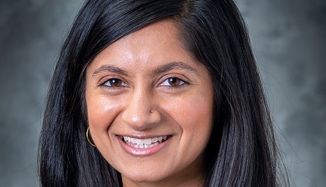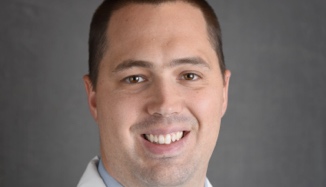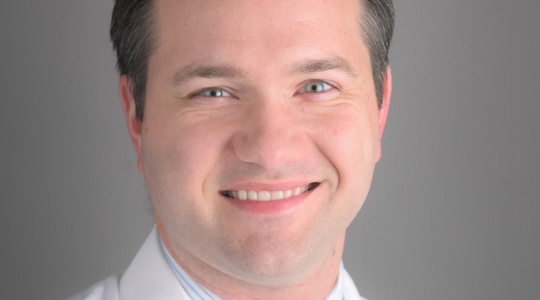Advanced Gastrointestinal & Minimally Invasive Surgery Fellowship
Atrium Health Carolinas Medical Center and Atrium Health Sanger Heart & Vascular Institute have provided world-class heart care for more than half a century, and are currently at the forefront in cardiovascular care. Within these state-of-the-art facilities and alongside these renowned physicians, fellows will gain the knowledge and skillset to become well-rounded, comprehensive vascular surgeons. This 2-year fellowship program provides in-depth knowledge of all aspects of vascular surgery to help fellows prepare for board certification and independent practice.
Where You Will Train

Carolinas Medical Center
Inpatient training is done exclusively at Carolinas Medical Center's 874-bed main facility. Our hospital is a regional aortic care center, level 1 trauma center and center of excellence in the treatment of carotid, peripheral arterial and venous disease. The facility features modern catheterization labs and hybrid operating suites, Intensive Care and vascular ultrasonography.
What Fellows are Saying
-

In researching vascular training programs, I was looking for strong mentorship, operative autonomy, and case complexity. The Carolinas Medical Center Vascular Fellowship is all of that and more. Our team of attendings, fellows, residents and advanced practice providers feels like family. The attendings are clearly invested in our education, growth and success. I know the top-notch training I am receiving at Carolinas Medical Center will prepare me for anything that comes my way as a future vascular surgeon.
Rajavi Parikh, DO, Junior Fellow
-

You will not find a better vascular surgery training program than Carolinas Medical Center. We have the opportunity to work with world-renowned surgeons, perform the entire breadth of vascular procedures and grow as surgeons and people in a family atmosphere. This program not only builds your surgical skills and knowledge base but also your confidence to be able to perform any procedure and treat any patient that may walk into your office or enter your ER. I not only feel prepared to start my career, I am excited to hopefully be able to pass on some of what I have learned to others.
Neil Poulsen, MD, Senior Fellow
-

People often ask me where I trained and I’m always proud to tell them that I trained at Carolinas Medical Center under some of the best teaching physicians in the country. This is a fellowship that prepares you for your post-training career. The sheer volume, complexity and quality of cases performed were key to my growth as a vascular trainee and built my confidence, both as an open and endovascular surgeon. The entire vascular team was amazing to work with. If I were to choose again, I would definitely choose to come here.
Magendran Danapal, MD, 2020 Vascular Surgery Fellowship Graduate
Meet the Faculty

Our vascular surgery fellowship program remains one of the most highly respected in the Carolinas because we consistently graduate world-class fellows who are dependable, innovative and skilled vascular surgeons. Under the mentorship of internationally respected faculty, our fellows are tasked with learning the nuances of quality patient care, investigating our clinical outcomes and presenting data at national meetings. We are grateful for your interest in our training program and invite you to dive deeper into our clinical and didactic curriculum, and realize how our Vascular Surgery Fellowship can help you achieve your professional goals.
Gregory Stanley, MD, Program Director
With a nationally and internationally renowned team of physicians who serve as faculty, our fellows have access to a breadth of experience and knowledge in the Vascular Surgery Fellowship program. View their bios.
Program Curriculum
The Vascular Surgery Fellowship is a 2-year program that covers all aspects of theoretical and practical teaching, immersing fellows in an array of vascular surgery knowledge. Following the guidelines of the Association of Program Directors in Vascular Surgery, the curriculum is enhanced by weekly discussions highlighting complex aortic and critical limb ischemia management as well as generating an understanding of the evolution of systemic vascular care. In addition to a robust curriculum and unlimited research opportunities, the program is supported by a dedicated, full-time surgical faculty that are fully committed to resident education. This program is accredited by the Accreditation Council for Graduate Medical Education (ACGME) and meets all educational objectives for board certification.
Learn moreRotations
Fellows will have primary but not exclusive responsibility for inpatient or outpatient services. The program pairs First- and Second- year fellows into clinical teams with rotating general surgery residents.
Salary and Benefits
In addition to the many educational and career benefits of the Vascular Surgery Fellowship program, fellows will receive financial benefits as well.
Learn moreApplication Criteria
Applications are accepted through the Electronic Residency Application Service (ERAS). Candidates will need to have completed a general surgery program approved by the Accreditation Council for Graduate Medical Education (ACGME).
Learn more